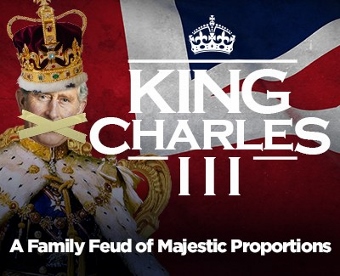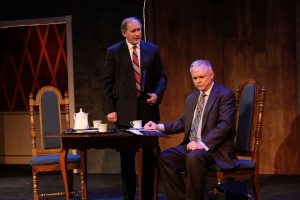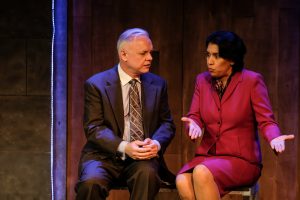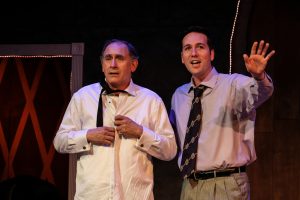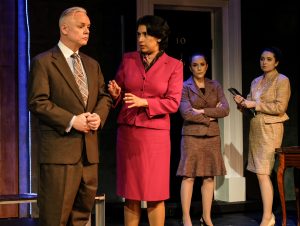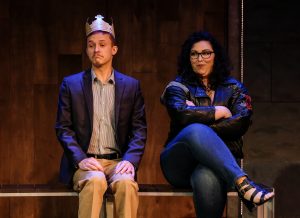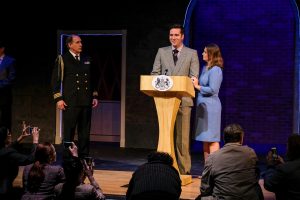WOULD SHAKESPEARE BY ANY OTHER PLAYWRIGHT
SMELL AS SWEET?
If the title King Charles III sounds rather Shakespearean, yet you cannot recall a “Charles” among all his Henrys and Richards, there’s a good reason. Mike Bartlett’s homage to the “Bard of Avon,” written just over 400 years later than Richard III, is about a king that Shakespeare could never have known. In fact, it’s about a king we are yet to encounter ourselves, but whom we expect to know in the decade to come. Charles III is the moniker for what Charles, Prince of Wales will be known as when he ascends to the crown after Queen Elizabeth passes. In this script, first produced in 2014 and then on to the West End, Broadway, and regional theater, Mr. Bartlett fictionalizes the rise and tribulations of the next King of England.
Mr. Bartlett takes great liberties with the personalities of the actual royals to create his storyline, in some cases flattering them and in other cases being less kind. He uses them more as inspiration than fact to tell a grand tale of a new king who wants to do good but who is hampered by the limitations of sovereignty under Parliament. For American audiences who may not know Parliamentary procedure, it is worthy to be informed that the prime minister meets with the sovereign (currently Queen Elizabeth) weekly to receive “Royal Assent” on all bills passed by Parliament. While technically the sovereign can veto the law, this rubber stamp approval is considered very much a polite formality. No monarch has attempted to interfere with Parliament’s decisions since the early 1700s. Herein lies the temptation and challenge for Charles.
It is not a power hungry Charles (Richard Rivera) but a noble one who wants Parliament to rethink a newly passed bill that would limit power of the press. Prime Minister Evans (Christopher Pittman) assumes that meetings with the new king will be formalities, as with Elizabeth, but a vital and eager Charles wants to be more involved. When freedom of the press in one bill catches his attention, he draws a line in the sand that no one expects. Will the people praise the new king’s quest for democratic principles or see him as pushing ancient tradition at the expense of 21st-century expectations?
The script features a highly-conflicted Prince William (Andrew Walters), a true-force-behind-the-man Princess Kate (sharply played by Julia Giolzetti), a fiercely loyal Camilla (Sandy Hotchkiss), and a Harry (Travis Rynders) who desperately wants out of the spotlight. All come into play as the stakes are raised and Charles challenges the hearts and minds of Britannia.
With numerous nods to Hamlet and Macbeth, Mr. Bartlett has dug in deep to create lines in traditional pentameter with frequent couplets that strongly intone the feeling of a true Shakespearean work. As with some Elizabethan works, it takes a bit of time to attune to the rhythm of the language (especially since, at Coronado Playhouse, the actors are not miked). But with only modern language and completely current references, King Charles III would not be any challenge for most theatergoers to follow and the storyline is compelling.
It came to the surprise of many that a community theater group was able to secure the rights to this highly-acclaimed Broadway show before the likes of Old Globe, La Jolla Playhouse, and Cygnet — all of whom had keen interest in it. By a matter of timing and serendipity, Coronado Playhouse won the first chance to produce on their small stage in San Diego. Costume designer Lisa Burgess is to be commended on creating such notably on-target costuming within the budget of a small theater company.
Two hours and forty-five minutes felt somewhat overwhelming for telling this tale as sections of the writing felt drawn out purely to create the Shakespearean tone. Much like some works of the First Folio being cut down in contemporary performances, King Charles III feels like it could use some editing to move things along (adapted by Bartlett, the 2017 filmed television version manages to get it down to 90 minutes). While that might be too drastic for the staged production, it supports the theory that, perhaps, this story could be told more tightly even if not matching the great master’s writing style at every turn.
Would the show have flown by in the hands and tongues of LAMDA-trained artists? Perhaps, but as Coronado holds the cards at this time, Tyler Richards Hewes’ direction and Vanessa Dinning’s dialect coaching have led to a performance caliber quite high for a purely non-equity show. Mr. Rivera successfully keeps Charles lively, relatable, and sympathetic. Mr. Rynders is noteworthy in touching us with the angst of a Harry who craves an identity but feels born to play second fiddle at best.
While unlikely to be a prophetic look at England in the 2020s, King Charles III is entertaining in plot and a gracious tribute to a writing style that still marvels centuries later.
photos by Ken Jacques
King Charles III
Coronado Playhouse
1835 Strand Ave. in Coronado
Thurs & Fri at 8; Sat at 2 & 8
ends on April 22, 2018
for tickets, call 619.435.4856 or visit Coronado Playhouse
